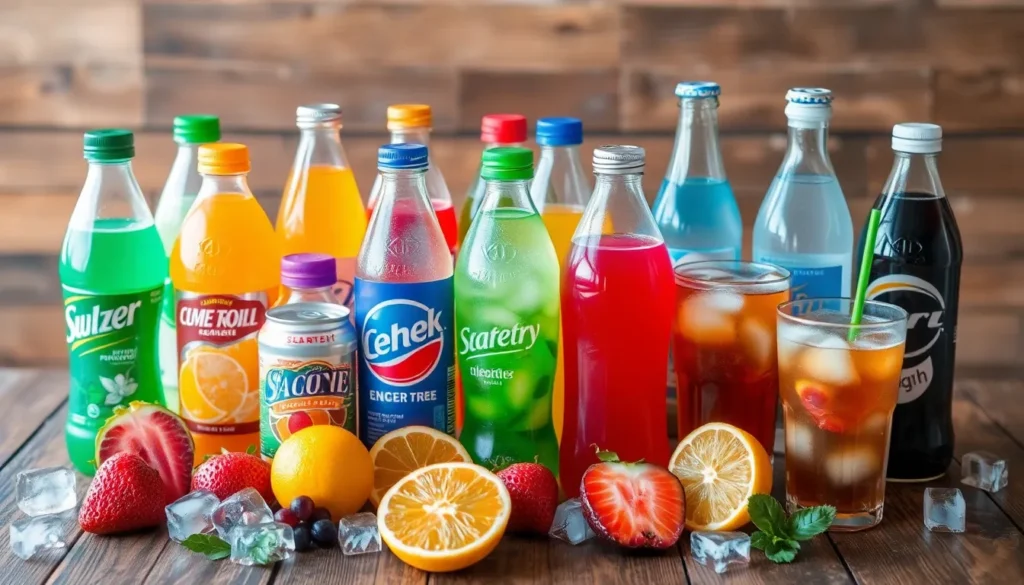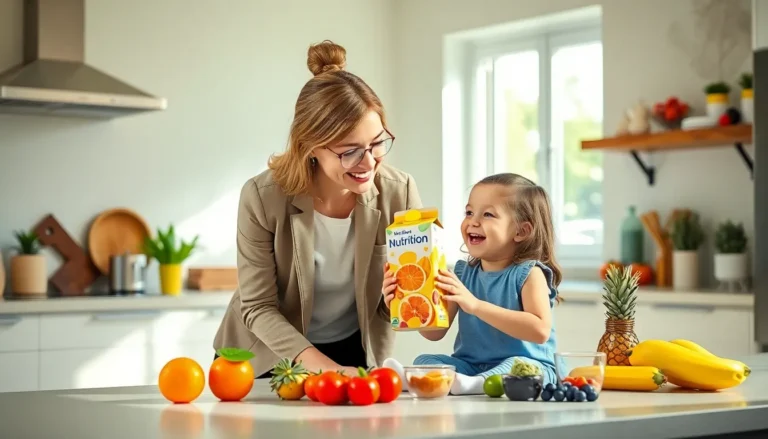Table of Contents
ToggleIn a world where sugar seems to sneak into everything from breakfast cereal to that innocent-looking salad dressing, sugar-free drinks are like a refreshing oasis in a desert of sweetness. They offer a guilt-free way to quench thirst without sending blood sugar levels on a rollercoaster ride. Who knew that ditching sugar could taste this good?
Overview of Sugar-Free Drinks
Sugar-free drinks refer to beverages that use artificial or natural sweeteners instead of sugar. These alternatives maintain sweetness without the extra calories. Popular options include diet sodas, flavored water, and sugar-free energy drinks.
Many sugar-free drinks utilize ingredients like aspartame, sucralose, or stevia. Aspartame is about 200 times sweeter than sugar, providing significant flavor without increasing calorie content. Sucralose, another common sweetener, retains its sweetness even when heated, making it ideal for various beverages. Stevia, derived from the leaves of the Stevia rebaudiana plant, offers a natural option favored by health-conscious consumers.
The market for sugar-free drinks has seen considerable growth. According to industry reports, the global sugar-free beverage market was valued at approximately $15 billion in 2022, with expectations to reach $24 billion by 2026. Increased awareness of health issues related to sugar consumption drives this trend, as consumers seek healthier options.
Taste remains a vital factor when selecting sugar-free drinks. Many brands invest in research and development to improve flavor profiles, aiming to replicate the taste of traditional sugary beverages. Some consumers report finding sugar-free alternatives satisfying, while others express preference for the authentic richness of sugary counterparts.
Labeling helps consumers make informed choices. The term “sugar-free” indicates less than 0.5 grams of sugar per serving, often addressing dietary restrictions for individuals managing conditions such as diabetes. Understanding ingredient lists further empowers consumers to select beverages that meet their health needs.
Sugar-free drinks provide flavorful options without added sugar. Their popularity continues to rise as consumers prioritize health and wellness.
Types of Sugar-Free Drinks

Sugar-free drinks come in various forms, each catering to different preferences and occasions. These beverages satisfy taste without added sugar, maintaining a diverse market appeal.
Soft Drinks
Soft drinks represent a popular category of sugar-free beverages. Brands offer numerous options, using artificial sweeteners like aspartame and sucralose to emulate the classic taste. Consumers often gravitate towards these products, enjoying flavors reminiscent of traditional cola and lemon-lime drinks. With projections estimating the sugar-free soft drink market reaching substantial growth, the choices continue to expand. Labels clearly indicate sugar content, helping those monitoring intake make informed selections.
Energy Drinks
Energy drinks also feature sugar-free varieties, designed for consumers seeking a boost without caloric sugar. These drinks often use sweeteners like sucralose and are formulated with caffeine and vitamins for enhanced energy. Many enjoy the revitalizing effects, especially during workouts or long days. The market for sugar-free energy drinks is expected to rise, driven by an active lifestyle and health-conscious consumers. Different flavors provide options, ensuring there’s something for everyone.
Sports Drinks
Sugar-free sports drinks provide hydration and electrolytes without the added sugar. Designed for athletes, these drinks replenish essential minerals lost during physical activity. Flavor options range from citrus to berry, appealing to a wide audience. Many athletes prefer these options to avoid sugar spikes during performance. Advanced formulations offer hydration support, aiming for optimal workout recovery.
Juices and Teas
Juices and teas represent another category of sugar-free options, typically using natural sweeteners like stevia. Brands create flavorful blends to satisfy consumers craving refreshing alternatives. Iced teas and flavored waters often fall under this category, providing energy without significant calories. Individuals seeking replacing sugary sodas find these beverages appealing, as they’re generally perceived as healthier choices. Variety in flavors ensures that drinkers can find delightful options for every occasion.
Benefits of Sugar-Free Drinks
Sugar-free drinks provide multiple health benefits, making them a popular choice among consumers. These beverages not only satisfy thirst but also support healthier lifestyles.
Calorie Reduction
Calorie reduction stands out as a primary advantage of sugar-free drinks. Many of these beverages contain significantly fewer calories compared to their sugary counterparts. For instance, a regular soda may have around 150 calories per 12-ounce serving, while a sugar-free version typically contains zero to five calories. This drastic difference allows individuals to enjoy their favorite flavors without the extra caloric intake. Reducing calorie consumption can aid in weight management, contributing to overall health and wellness.
Blood Sugar Control
Blood sugar control is another critical benefit of sugar-free drinks. Sugar-free options do not lead to spikes in blood glucose levels, which is essential for individuals monitoring their sugar intake. For people with diabetes, selecting beverages with artificial or natural sweeteners proves better than traditional sugary drinks. Maintaining stable blood sugar levels helps in managing energy levels and reducing cravings. Hence, incorporating sugar-free drinks into a diet offers both enjoyment and a way to support metabolic health.
Potential Drawbacks of Sugar-Free Drinks
While sugar-free drinks seem beneficial, potential drawbacks exist that consumers should consider. Some individuals experience adverse health effects from artificial sweeteners used in these beverages.
Health Concerns
Health considerations arise from certain sugar substitutes. Aspartame and sucralose can lead to digestive issues like bloating or gas for some individuals. Research suggests a possible link between high consumption of these sweeteners and increased cravings for sugary foods. Moreover, some studies indicate that frequent use may affect gut health negatively. Monitoring intake proves wise for consumers aiming to avoid these unwanted side effects.
Taste Preferences
Taste preference varies significantly among individuals. Many consumers find the flavor of sugar-free drinks distinctly different from their sugary counterparts. Some people develop a sensitivity to sweetness, experiencing changes in taste perception after regularly consuming these beverages. As brands strive to replicate classic flavors, the success rate isn’t universal, leaving some consumers unsatisfied. Ensuring an enjoyable taste experience remains a primary concern in expanding the market of sugar-free options.
Popular Brands and Products
Numerous brands dominate the sugar-free drink market, offering consumers a variety of flavorful options. Coca-Cola Zero Sugar stands out for its classic cola flavor, appealing to those who want a familiar taste without calories. Pepsi Zero Sugar provides a similar experience, allowing fans of Pepsi to enjoy their favorite drink without sugar.
Diet Snapple showcases a range of iced teas, each made with artificial sweeteners to maintain their refreshing taste. For energy drink enthusiasts, Monster Energy offers Zero Sugar varieties, ensuring energy boosts without added sugar. Vitaminwater Zero combines hydration with flavor, providing a sugar-free alternative to traditional juices.
SodaStream delivers the ability to create customized sparkling beverages at home, perfect for those who prefer controlling sweetness levels. La Croix continues to gain popularity among sparkling water lovers, featuring naturally flavored options that are naturally sugar-free. Sports drinks like Gatorade Zero cater to athletes needing electrolytes without the extra calories from sugar.
Diet Dr Pepper captures the taste of classic Dr Pepper while eliminating sugar, making it a favorite among fans of unique flavors. Honest Tea also features sugar-free options, focusing on organic ingredients and natural sweetness, appealing to health-conscious consumers.
In terms of herbal teas, brands like Celestial Seasonings provide rich flavors without sugar, adding variety to the sugar-free beverage landscape. Each of these brands emphasizes accessibility while expanding choices for consumers aiming to reduce sugar intake.
Sugar-free drinks are carving out a significant niche in the beverage market. With a diverse range of options available consumers can find flavorful alternatives that align with their health goals. These drinks not only help reduce calorie intake but also support blood sugar management making them appealing to a broad audience.
As the market continues to grow brands are focusing on taste and quality to meet consumer demands. While there are considerations regarding artificial sweeteners it’s clear that sugar-free beverages offer a satisfying way to enjoy drinks without the guilt. By exploring these options individuals can make informed choices that benefit their overall well-being.





